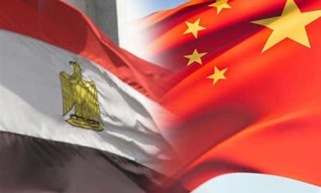When Egypt recognized the People's Republic of China in 1956 -- the first Middle Eastern and African country to do so -- it ushered the fledgling communist country into the broader international community beyond the Soviet bloc. Six decades later, China is returning the favor. In December, both President Abdel Fattah el-Sisi and President Xi Jinping agreed to elevate their bilateral relationship to a "comprehensive strategic partnership." In practical terms, this new relationship signifies that China has solidified its position with the largest Arab Muslim country through a series of economic and military commitments.
Strategically, President Sisi is clever to look East. China has recently become the world's largest economy, and President Xi has shown his willingness to use its economic clout to strengthen ties with countries considered important to China's economic and security interests. A friendly Egypt provides China a gateway to the Middle East and Africa. It also helps that the Sisi government are opponents of Islamic fundamentalism as China faces increasing unrest from its Muslim minority in Xinjiang province.
Turning around the distressed Egyptian economy after three years of revolution and political instability is a significant challenge. President Sisi's ability to govern hinges on providing stability as well as creating jobs, economic opportunity and faith in the future for the Egyptian people.
The Chinese economic development path provides a possible model for Egypt to follow in its own revitalization effort. Egypt can receive much needed economic guidance and financial support from China. And, China's ability to provide infrastructure financing and its experience managing heavy infrastructure projects will help jump start many of the priority projects announced by the Sisi government.
Sisi is off to an aggressive start. Egypt has launched an economic diplomacy campaign to seek foreign direct investment as well as increase its exports. A series of Ministers covering investment, tourism, and finance as well as the President and Prime Minister, have been traveling the globe to promote that Egypt "is open for business." This campaign will culminate in a major investment summit in March that will showcase the opportunities - primarily in infrastructure development.
Without direct foreign investment, which plummeted from about $8 billion down to $1.3 billion in 2013, President Sisi will not be able to achieve his ambitious reform program. China ranks only 15 in terms of investment in Egypt so there is room to grow. The most visible project is the widening of the Suez Canal launched by President Sisi, but there are other vital strategic efforts opening to investment, including the expansion of the special economic zones, development of road networks, building of medical tourism cities, development of an undersea tunnel, development of coal plants and construction of nuclear power plants.
For China, two newly opening sectors could prove the most mutually beneficial: sustainable growth and tourism. China is the world's leading producer of solar panels; Egypt needs new energy sources to reduce overall costs. Though Sisi has cut energy subsidies down from a high of 20 percent, they still make up 13 percent of government spending. Use of renewables, logically solar in a country like Egypt with a "sunshine duration" of about of about 4,000 hours a year, will help reduce these costs. Increased use of renewable energy will improve air quality with less reliance on high-polluting fossil fuels.
Egypt can also benefit from China's fast growing tourist class. Its rising middle class, who spent over $155 billion in 2013, are the new global travelers. These numbers are merely the tip of the pyramid. By 2020, the number of foreign trips made by Chinese will double and spending by Chinese tourists abroad will triple.
President Sisi wisely courted the Chinese tourism sector while in Beijing, but to genuinely attract and sustain a steady stream of sophisticated Chinese tourists, Egypt must create a welcoming environment -- Mandarin-speaking tour guides, hotels geared towards Chinese tastes, as well as upgrade the management of its world famous heritage sites to withstand a rush of new visitors.
President Xi called this new strategic relationship "an important milestone." China has already pledged infrastructure loans through the $40 billion Silk Road Fund, which promotes investment along the ancient silk route. Egypt also committed to support this initiative as well as the 21st-Century Maritime Silk Road. Egypt's support is important as China seeks to reshape the global lending landscape. Chinese state-owned enterprises will be building nuclear plants, constructing a high-speed rail line, and start working on portions of the Suez Canal Corridor project.
China has an ally in the new Egypt -- which is reestablishing its position as one of the leading forces in the Arab World just as China is facing internal threats by the Muslim minority in Xinjiang province. With Egypt's participation in the Silk Road and Maritime initiatives, it is well positioned to be China's route to the Middle East and Africa.
China will benefit from this new partnership -- both economically and militarily. For President Sisi, China is essential to his ability to deliver on his ambitious economic reform program and solidify his reputation as more than a military leader but a global statesman. This is a partnership to watch.

